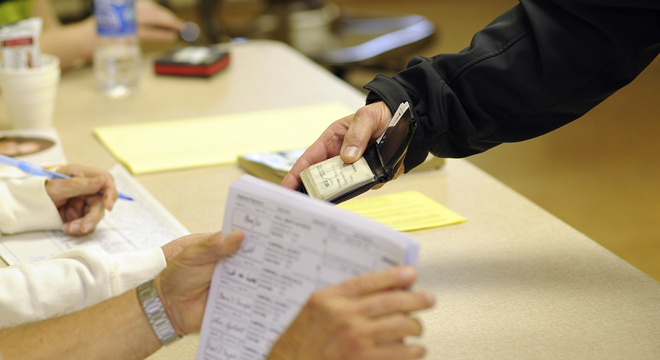Updated: 4:15PM
The Pennsylvania Supreme Court cast serious doubt on the state’s voter ID law on Tuesday, ordering a lower court to rethink its decision upholding the law earlier this year.
In a 4-2 ruling, the justices ordered the lower court to block the law unless Pennsylvania can prove it is currently providing “liberal access” to photo identification cards and that there “will be no voter disenfranchisement” on Election Day. The two dissenters opposed the voter ID law and wanted the Supreme Court to issue an injunction itself.
The ruling said there was a “disconnect” between what the law prescribes and how it was actually being implemented. It said an “ambitious effort” to implement identification procedures in a short timeframe “has by no means been seamless in light of the serious operational constraints faced by the executive branch.”
While the court had “no doubt” state officials were “proceeding in good faith,” the justices in the majority said they were not satisfied making “a mere predictive judgment based primarily on the assurances of government officials.”
But beyond simply punting the decision, the Supreme Court specifically said the lower court would be “obliged to enter a preliminary injunction” if there was convincing proof that voters would be disenfranchised in the upcoming election because of the law.
The lower court was told to consider “whether the procedures being used for deployment of the cards comport with the requirement of liberal access which the General Assembly attached to the issuance of PennDOT identification cards.”
After the ruling, the plaintiffs said they were happy about the decision and optimistic the lower court would eventually stop the law in its tracks.
“We’re glad to see that Pennsylvania Supreme Court is taking the actual impact on voters seriously,” said Advancement Project Co-Director Judith Browne Dianis. “Requiring the state to prove the law will not disenfranchise voters is the right step to take. We’re confident that the evidence demonstrates that this law does disenfranchise of hundreds of thousands of Pennsylvania voters and should be enjoined.”
Advancement Project Co-Director Penda Hair told TPM that the decision came as a surprise.
“We prepared for losing. We prepared for winning. Nobody had really prepared for remanding,” Hair said. “I think that the legal conclusion that the Pennsylvania Supreme Court reaches is one that’s very favorable to voters. They seem to say there needs to be actual evidence that voters are not being disenfranchised or else an injunction needs to be entered,” adding that the court had implemented a “high standard that protects voters.”
David Gersch, a trial lawyer in the case, said he believes Pennsylvania “will have a lot of trouble” reaching the standard imposed by the Supreme Court. “When we go back before Judge [Robert] Simpson, the Commonwealth is going to have a lot of show.”
A spokeswoman for Pennsylvania Gov. Tom Corbett (R) did not immediately respond to TPM’s request for comment.









